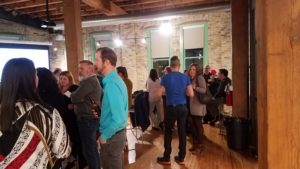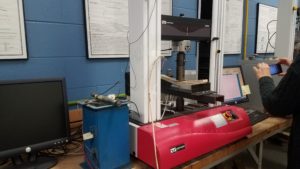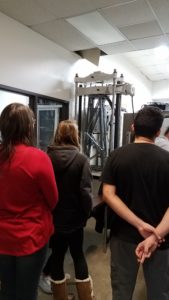Maps as a Point of Engagement
The idea for session came out of conversations we had last summer with Donna Genzmer and Kate Madison faculty members at UWM. Kate and Donna run UWM’s Power of Data Teacher Workshops. The Power of Data (POD) Project offers a 35 hour professional development program in mid-June that helps secondary teachers enhance existing lessons with Geospatial Inquiry. Through NSF funding the program is both free for teachers and offers a stipend to participants. We thought it would be useful to offer teachers interested in exploring how to leverage maps/Geographic Information Systems (GIS) tools a chance to explore some ideas, and connect with resources early in the year so they might better be able to leverage the PODs training.
 Milwaukee has a wealth of GIS talent at area universities, industries, and non-profits. Our featured participants brought a broad range of expertise and practical knowledge in the use of GIS/spatial data analysis across a variety of domains. We structured the session to allow participants to share their interests in exposing students to spatial data, explore ideas for potential projects, and solicit advice for how to make that happen.
Milwaukee has a wealth of GIS talent at area universities, industries, and non-profits. Our featured participants brought a broad range of expertise and practical knowledge in the use of GIS/spatial data analysis across a variety of domains. We structured the session to allow participants to share their interests in exposing students to spatial data, explore ideas for potential projects, and solicit advice for how to make that happen.
That covered some pretty broad territory:
-
- Neighborhood asset mapping
- Macro economic data to map micro space
- Conservation/spatial learning re Zoo animals
- Connections to Math (social justice)
- Viable composting sites
- Linking environmental issues through maps
- Past/present/future of place
- Location of “good” landlords/housing
- Location of bird houses
- Parent pickup
- Crime geography/address social justice
- Locations for mobile maker space visits
- Place of residence w/respect to school
- Invasive/native plant distribution
- Land and resource usemap
- Suburban/urban agriculture
- Watershed education
- Green infrastructure
- Food deserts
- Location for community gardens
- Data visualization
- Develop GIS Apps w/IT/GIS skills
- Freshwater connections
- Connect people to water resources
- Rainwater flow
- Safety
- Waste stream
- Climate
- Location of Companies
Upcoming workshops:
Milwaukee Community Map
Tuesday February 19th
4:30 to 5:30 PM
Arts@Large – 908 S. 5th Street, Milwaukee
details
PODS Workshops
UWM POD Workshop #1
June 3 — 7, 2019, UWM Library
UWM POD Workshop #2
June 17 — 21, 2019, UWM Library
details
Thanks again to The Commons for providing the space and to Marvin and our featured participants for the experience and insight they brought to the discussion:
Emily Champagne – GIS Supervisor, Milwaukee Metropolitan Sewerage District (MMSD)
Donna Genzmer, GISP – Director, Cartography & GIS Center, University of Wisconsin-Milwaukee
Auriana Gilliland-Lloyd – Conservation Assistant, Bonobo & Congo Biodiversity Initiative, Zoological Society of Milwaukee
Lawrence Hoffman – GIS Program Manager, Groundwork Milwaukee
Beth Haskovec – Program Officer, LISC Milwaukee
Kate Madison – Policy Analyst, UWM’s Center for Economic Development
Dr. Aleksandra Snowden Ph.D. – Assistant Professor Social & Cultural Sciences, Marquette University
Michael Timm – Reflo/Milwaukee Community Map
 On Thursday UWM’s College of Engineering and Applied Sciences hosted the first of three sessions for students in our Zoo Train challenge. We met in the College’s new maker space where students from Franklin High School used short lengths of lath to assemble beams of various configurations. With these in hand, students went from there to the structural testing lab where UWM faculty had students estimate the maximum load their beam design could support. Each design was tested to the point of failure.
On Thursday UWM’s College of Engineering and Applied Sciences hosted the first of three sessions for students in our Zoo Train challenge. We met in the College’s new maker space where students from Franklin High School used short lengths of lath to assemble beams of various configurations. With these in hand, students went from there to the structural testing lab where UWM faculty had students estimate the maximum load their beam design could support. Each design was tested to the point of failure. For round two, students went back to the maker space to design and assemble a five foot high tower from angle irons. That tower was put under load in a different device to measure deflection. The maximum load there was capped at twice the load the Zoo’s water tower needs to support.
For round two, students went back to the maker space to design and assemble a five foot high tower from angle irons. That tower was put under load in a different device to measure deflection. The maximum load there was capped at twice the load the Zoo’s water tower needs to support.

